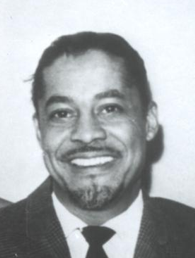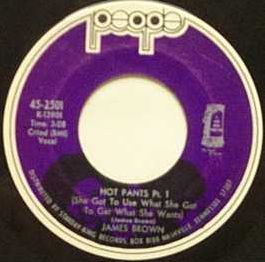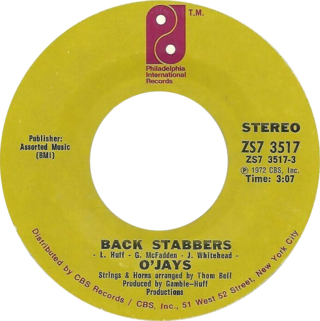Fred Hughes | |
|---|---|
 Circa 1970 | |
| Background information | |
| Birth name | Fred Henry Hughes |
| Born | Arkansas, U.S. |
| Genres | R&B |
| Occupation | Singer |
| Website | www |
Fred Henry Hughes is an American R&B singer.
Fred Hughes | |
|---|---|
 Circa 1970 | |
| Background information | |
| Birth name | Fred Henry Hughes |
| Born | Arkansas, U.S. |
| Genres | R&B |
| Occupation | Singer |
| Website | www |
Fred Henry Hughes is an American R&B singer.
Hughes was born in Arkansas, but moved to Compton, California. [1] He first recorded while a student at Compton High School as a member of the Cymbals in 1962, [2] and worked as a member of a band, the Creators.
Hughes was signed up for Vee-Jay Records by the label's A&R chief on the West Coast in the 1960s shortly before its demise, scoring hits in 1965 with the singles "Oo Wee Baby, I Love You" (number 3 R&B and number 23 Pop) and "You Can't Take It Away" (another top 20 R&B hit, number 96 Pop), written and produced by Richard Parker. [3] [4] Released in Britain on the Fontana label, "Oo Wee Baby" became a soul classic and was re-released in 1976 by DJM Records because of demand, according to the record's picture sleeve.
The singer's career struggled after his label's collapse, although he had a couple of Richard Parker-produced singles released on Exodus, run by Vee-Jay personnel briefly in 1966, and another two later on Chess Records.
In 1969, Hughes signed with another Chicago label, Brunswick Records and although failing to reach the pop charts, two releases for the label became R&B successes, "Baby Boy" at number 25 and "I Understand" at number 45. [5] An album was later released by Brunswick featuring the two hits.
According to his blog, Fred Hughes is often confused with Freddie Hughes, an Oakland, California recording artist, and Castlemont High School graduate. The 1988 edition of Joel Whitburn's Billboard-based book Top R&B Singles lists releases by both artists together as if they were one artist, whilst AllMusic Guide's brief biography of Fred Hughes conflates the two artists, but in later editions of Whitburn's Top Pop Singles it separates the two artists, as of the 1994 edition. [1]
In 2014, Fred Hughes' "Baby Boy", a favorite on the UK's Northern soul scene, was featured in the film Northern Soul . [6]

Benjamin Franklin Peay, known professionally as Brook Benton, was an American singer and songwriter whose music transcended rock and roll, rhythm and blues, and pop music genres in the 1950s and 1960s, with hits such as "It's Just a Matter of Time" and "Endlessly".

"That'll Be the Day" is a song written by Buddy Holly and Jerry Allison. It was first recorded by Buddy Holly and the Three Tunes in 1956 and was re-recorded in 1957 by Holly and his new band, the Crickets. The 1957 recording achieved widespread success. Holly's producer, Norman Petty, was credited as a co-writer, although he did not contribute to the composition.

Carla Venita Thomas is an American singer, who is often referred to as the Queen of Memphis Soul. She is best known for her 1960s recordings for Atlantic and Stax including the hits "Gee Whiz " (1960), "B-A-B-Y" (1966) and "Tramp" (1967), a duet with Otis Redding. She is the daughter of Rufus Thomas.

Gene Chandler is an American singer, songwriter, music producer, and record-label executive. Chandler is nicknamed "the Duke of Earl" or, simply, "the Duke." He is best known for his most successful songs, "Duke of Earl" and "Groovy Situation", and his association with the Dukays, the Impressions, and Curtis Mayfield.
"Don't Look Back" is a 1965 song recorded by The Temptations for the Gordy (Motown) label. The flip side to their Top 20 hit "My Baby", "Don't Look Back" broke out and became a hit among the R&B audience on its own, reaching #14 on the R&B charts.

Donnie Elbert was an American soul singer and songwriter, who had a prolific career from the mid-1950s to the late 1970s. His U.S. hits included "Where Did Our Love Go?" (1971), and his reputation as a Northern soul artist in the UK was secured by "A Little Piece of Leather", a performance highlighting his powerful falsetto voice.
Garnet Mimms is an American singer, influential in soul music and rhythm and blues. He first achieved success as the lead singer of Garnet Mimms & The Enchanters and is best known for the 1963 hit "Cry Baby", later recorded by Janis Joplin. According to Steve Huey at AllMusic, his "pleading, gospel-derived intensity made him one of the earliest true soul singers [and] his legacy remains criminally underappreciated."

Ernest Aaron Freeman was an American pianist, organist, bandleader, and arranger. He was responsible for arranging many successful rhythm and blues and pop records from the 1950s to the 1970s.

"Hot Pants (She Got to Use What She Got to Get What She Wants)" is a 1971 song by American singer James Brown, released as a single on his People Records label (then distributed by King Records) in July of that year with "Pt. 1" on the A-side and "Pt. 2 and 3" on the B-side. It was a number-one hit on the Billboard R&B chart, and reached number fifteen on the Hot 100 and number ten on the Cashbox magazine charts. "Hot Pants" was Brown's final release under King's purview before he and the People label moved to Polydor Records.

Dee Clark was an American soul singer and songwriter best known for a string of R&B and pop hits in the late 1950s and early 1960s, including the song "Raindrops", which became a million-seller in the United States in 1961.

"Back Stabbers" is a 1972 song by the O'Jays. Released from the hit album of the same name, it spent one week at number 1 on the Hot Soul Singles chart. It was also successful on the pop chart, peaking at number 3 on the Billboard Hot 100 in October 1972. The narrator in "Back Stabbers" warns men about their male "friends" who smile to their faces, but are secretly planning to steal their wives or girlfriends. It was inspired by an earlier hit with a similar theme, the Undisputed Truth's "Smiling Faces Sometimes", the chorus of which is quoted at the end of this song. It was part of the soundtrack for the 1977 movie, Looking for Mr. Goodbar. In 2002, the song was sampled by R&B artist Angie Stone for her single "Wish I Didn't Miss You".
"It's Just a Matter of Time" is a Pop song written by Brook Benton, Clyde Otis, and Belford Hendricks. The original recording by Benton topped the Billboard Hot R&B Sides chart in 1959 and peaked at No. 3 on the Hot 100 pop chart, the first in a string of hits for Benton that ran through 1970.

"Easier Said Than Done" is a popular song sung by The Essex that was a number-one song in the United States during 1963. It topped the Billboard Hot 100 singles chart on July 6, 1963, and remained there for two weeks. The song was written by William Linton and Larry Huff (1941-2002).

"Do It Baby" is a 1974 single recorded and released by the Motown R&B group The Miracles. The song was taken from the album of the same name, and written by Motown staff songwriters Freddie Perren and Christine Yarian and produced by Perren.

Jimmy J. Hughes is an American former rhythm and blues singer, whose biggest successes in the mid-1960s, notably his hit "Steal Away", were important in the early development of the Muscle Shoals music industry.

"Just a Little Bit" is an R&B-style blues song recorded by Rosco Gordon in 1959. It was a hit in both the R&B and pop charts. Called "one of the standards of contemporary blues," "Just a Little Bit" has been recorded by various other artists, including Little Milton and Roy Head, who also had record chart successes with the song.
"Devil or Angel" is a song written by Blanche Carter and originally recorded by the Clovers in 1955, where it went to number four on the US R&B Best Sellers chart. It was re-recorded by John Bailey after he left the Clovers and formed another Clovers group for Lana Records in 1965.
Fred Willie Hughes Jr. was an American gospel, soul, and R&B singer, perhaps best known for his 1968 song, "Send My Baby Back".
A Bobby Vee Recording Session is the sixth studio album American singer Bobby Vee, and was released in May 1962 by Liberty Records.

Take Good Care of My Baby is the fifth studio album American singer Bobby Vee, and was released in 1962 by Liberty Records.